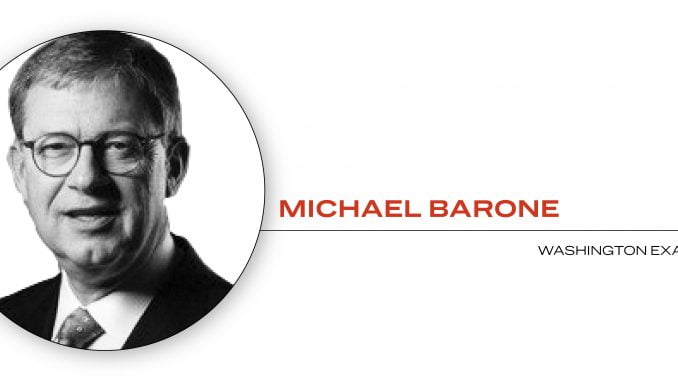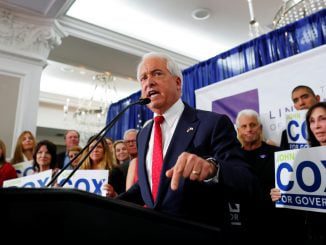
The last six or seven months have been a couple of tough seasons for public policies based on lies.
Two examples come to mind. One is the Disinformation industry, which has eroded the credibility of the public health establishment. The other is the Diversity, Equity, Inclusion (DEI) industry, which has infected American higher education with a culture of lying.
The Disinformation industry was spawned by social media companies, notably Facebook, whose leaders, egged on by Democratic politicians, thought their responsibility was less to communicate accurate information than to suppress information they considered politically dangerous.
The Biden administration even set up an ominously titled Disinformation Governance Board. And we got episodes like Facebook’s suppression of the New York Post’s true October 2020 stories about Hunter Biden’s laptop — an unacknowledged contribution to Joe Biden’s campaign.
Less partisan but more insidious was social media’s cooperation with Dr. Anthony Fauci’s dismissal of the theory that the Covid pandemic resulted from a leak from the laboratory in Wuhan, China, whose research Fauci’s agency had funded.
The dismissal of the lab leak hypothesis as a “conspiracy theory” was, in fact, the result of a conspiracy. In February 2020, Fauci and National Institutes of Health Director Francis Collins used their leverage over research grants to get scientists who considered the lab leak theory plausible to write an article dismissing it. Fauci, with breathtaking dishonesty, then referred the press to the article as if he had had nothing to do with it.
On COVID-19, as on other issues, as fivethirtyeight.com founder Nate Silver has written, the disinformation label “has been hijacked by people of a certain (progressive) political persuasion to lend a veneer of expertise to suppress debate on legitimate controversies.” The result is that Disinformation journalism has turned out, as Silver puts it, “to be less truth-driven than other journalism on average.”
Fortunately, writers such as the British journalist Matt Ridley and longtime New York Times science reporter Nicholas Wade have kept investigating the evidence, which tilts increasingly to the lab leak explanation, and by early 2023, the Biden administration Energy Department and the FBI accepted the lab leak theory as the likely cause of the COVID-19 pandemic. But the Disinformation industry discredited not only itself but, more damagingly, American and international public health research institutions.
Similarly, the comically misnamed Diversity, Equity, Inclusion industry in colleges and universities has discredited itself and higher education institutions generally, slowly, over recent years and then suddenly within the last several months.
The Supreme Court’s decision last June in Students for Fair Admissions v. Harvard laid bare the blatant racial quotas and preferences employed by selective universities — and the systemic lies that administrators propagate among themselves and to the world outside about their blatant discrimination against Asians and white males.
This has been an open secret for some time, even as the overwhelming majority of Americans reject this DEI version of racial discrimination. Thus, California voters in 2020 rejected 57% to 43% a measure to overturn the racial quotas and preferences in state universities they had adopted 55% to 45% in 1996. That was a California electorate that grew more Democratic over those 24 years, from 51% for Bill Clinton to 64% for Joe Biden.
The universities’ systemic dishonesty about quotas extends to other areas. Harvard graduate Josh Barro, writing in The Atlantic on “post-truth” universities, notes “widespread research dishonesty in behavioral science” — lots of psychological experiments can’t be replicated — and “beyond the social sciences” and laments Harvard’s overall posture of dishonesty and non-transparency.
Another illustration of the intellectual flimsiness comes from across the Charles River, at Boston University, where in September came the news that Ibram X. Kendi was laying off half the staff at his lavishly funded “research” center. Kendi was widely feted for his claim that any difference in racial percentages in any profession or category was the result of “systemic racism” but was not reported as applying that critique to his own enterprise.
Then, in December, there was the spectacle of Harvard President Claudine Gay, who made her way upward by championing DEI policies, joining other university presidents in telling a congressional committee that punishing advocacy of genocide of Jews depends on “context.” Just days afterward, Gay was revealed to be a serial plagiarizer in her sparse scholarly writings, and she resigned on Jan. 2.
America’s health research institutions and universities were created in the first half of the 20th century by far-seeing philanthropists. They made this nation the world leader in the century’s second half. In the 21st century, they have saddled themselves with the Disinformation and DEI industrial complexes and their corrosive culture of systemic lying. Can they recover, or be replaced by something better?
Michael Barone is a senior political analyst for the Washington Examiner, resident fellow at the American Enterprise Institute and longtime co-author of The Almanac of American Politics.



